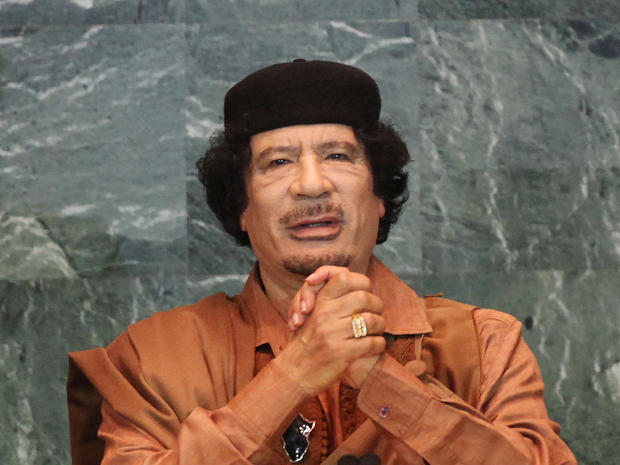Obama's next move at U.N.: Exclude Qaddafi?
Updated 4:58 p.m. ET
Libya's Col. Muammar Qaddafi has made several new diplomatic moves.
As Qaddafi's brutal crackdown on protesters began, his U.N. Ambassador and Deputy Ambassador became opponents of the regime. They branded Qaddafi a war criminal, condemned his actions against unarmed civilians, and called for a U.N. Security Council meeting.
Qaddafi's government shot off two letters to U.N. Secretary General Ban Ki-moon late this week naming a new U.N. permanent representative, Ali Abdussalah Treki, and withdrawing credentials for Ambassador Mohamed Shalgham and Deputy Ambassador Ibrahim Dabbashi.
Many people remember Treki as the General Assembly President during the notorious 2009 visit of Qaddafi, with his head in his hands, as Qaddafi went over time by an hour and twenty minutes in a rambling, somewhat incoherent U.N. address.
In formal terms, the letters put the Secretary General in a box, since a Head of Government usually appoints his or her Ambassador.
U.N. Secretary General Spokesperson Martin Nesirky told CBS News, "Actually it is not the Secretary General's decision to accept the credentials. If any new Permanent Representative, designated by their country, arrives in New York and asks to present his credentials, the Secretary General must accept them."
But, as is often the case, international law and the U.N. have their exceptions.
As recently as this past December, the Spokesman for the U.N. General Assembly President Jean-Victor Nkolo pointed out to CBS News, that the U.N. General Assembly voted to accept the credentials of Ambassador Joseph Bemba of the Ivory Coast and to withdraw the credentials of the Ambassador of the outgoing president Laurent Gbagbo, who refused to give up the presidency after being defeated in an election.
More memorable was the 1971 vote by the U.N. General Assembly withdraw recognition of the Republic of China (Taiwan) as the legitimate government of China to grant credentials to the Ambassador of the Peoples Republic of China (PRC). That decision was made after a vote by the General Assembly, and dealt only with the credentials, stating that the PRC representatives were the only legitimate representatives of China to the U.N., a vote that did not deal with the merits of country membership, which would have required a Security Council vote on the subject.
Before the letters arrived, Libya's Ambassador Mohamed Shalgham and Deputy Ambassador Ibrahim Dabbashi started as "dueling Ambassadors" with Shalgham supporting the government of Qaddafi and Dabbashi opposing it.
But then, both became critics of the government, first on February 22, Dabbashi called for a U.N. Security Council meeting to condemn Qaddafi, and later, on February 26, both the Ambassador and the Deputy Ambassador spoke to the U.N. Security Council, as it imposed sanctions on Libya and on Qaddafi, and referred the case to the International Criminal Court. Dabbasi, in an impassioned statement, cried when he spoke of the attacks against protesters.
Nonetheless, in U.N. terms, it was an unusual situation, one in which a country's representatives were condemning their own government. U.N. diplomats knew that it would last only until Qaddafi noticed it and had time to attempt to remove the two representatives.
Nkolo, who was also Treki's spokesperson when he was the President of the General Assembly, told CBS News that it was an unusual situation, indeed, but that until there was a communication from Qaddafi, the U.N. was on board to hear from the two anti-Qaddafi representatives, saying, "It is not a crime to speak your mind."
In the days that followed, Secretary of State Clinton, went to Geneva and successfully garnered a recommendation of the U.N. Human Rights Council to suspend Libya from that body, and the U.N. General Assembly voted to support that recommendation. And, the International Criminal Court Prosecutor, Luis Moreno Ocampo began an investigation into the Libyan actions and named Qaddafi in the proceedings.
Nkolo told CBS News that there has been no communication from the former U.N. General Assembly President, Treki, on his new appointment. If he is not in the U.S., the Obama administration might exercise their right to deny him a visa, although that is a bit tricky if he is a U.N. Ambassador, under U.S. law.
But there is another diplomatic precedent that the Obama Administration, NATO nations, and the Arab League could look to for its next move to isolate Qaddafi, and that is the examples of China and the Ivory Coast. An argument could be made that U.N. member nations could introduce a U.N. General Assembly Resolution to continue to accept the credentials of Ambassador Mohamed Shalgham and Deputy Ambassador Ibrahim Dabbashi and not accept the credentials of the new Ambassadorial appointment of Qaddafi.
Will any of these diplomatic moves marginalize Qaddafi so much that he flees to Venezuela or Zimbabwe or someone in his own military takes him into custody? Probably not, in the short term, but the U.N. sanctions, including the seizure of Libyan assets under the new U.N. Resolution is starting to add up to billions of dollars.
A debate about whether the U.N. would authorize "no-fly" zones is looming, if Qaddafi continues to attack unarmed civilians. China is the President of the U.N. Security Council for the month of March and has expressed its reluctance to endorse the measure. If Ambassadors Shalgham and Dabbasi were to continue at the U.N., they might be in a position to represent more legitimately what the Libyan people and the opposition to Qaddafi would want to occur, as the battles continue to rage between the Qaddafi forces and the rebels.
In the meanwhile, Qaddafi's regime has asked the Arab League to reverse the decision to suspend Libya from Arab League meetings and has written to the U.N. Security Council President to complain of the U.N. sanctions, imposed on February 26. Clearly, the battle for Libya is being fought on the ground, but the international community's diplomatic isolation is having an impact.
Pamela Falk, based at the U.N. is CBS News Foreign Affairs Analyst and an international lawyer.

